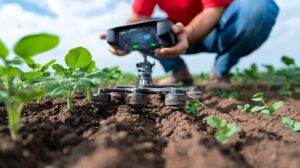In recent years, precision agriculture has revolutionized farming practices across the United States. By leveraging advanced technology and data analytics, farmers can optimize their crop production and improve soil health. This article will explore the benefits and techniques of USA precision agriculture services and their impact on soil health.
Precision agriculture USA continues to advance as farmers adopt data-driven tools to improve field performance. By focusing on precision agriculture soil health, growers can implement sustainable farming practices USA that reduce inputs, protect soil resources, and support long-term productivity.
What is Precision Agriculture?
Precision agriculture is a farming management approach that uses technology to monitor and manage variations in the field. This method allows farmers to tailor their farming practices to the specific needs of each part of their fields. Precision agriculture involves the use of various technologies, including GPS, sensors, drones, and data analytics.
Benefits of Precision Agriculture:
1. Increased Efficiency:
Precision agriculture helps farmers use resources more efficiently. By applying water, fertilizers, and pesticides only where they are needed, farmers can reduce waste and lower costs.
2. Improved Crop Yields:
By closely monitoring crop health and soil conditions, farmers can address issues promptly and optimize growing conditions. This leads to higher crop yields and better quality produce.
3. Environmental Protection:
Precision agriculture reduces the environmental impact of farming. By minimizing the use of chemicals and conserving water, it helps protect natural resources and promotes sustainability.

Source: Freepik
Precision Agriculture Techniques:
1. GPS and Mapping:
Global Positioning System (GPS) technology helps farmers create detailed maps of their fields. These maps provide valuable data on soil types, moisture levels, and crop health, enabling farmers to make informed decisions.
2. Soil Sensors:
Soil sensors measure various parameters such as moisture, temperature, and nutrient levels. This real-time data helps farmers understand the specific needs of their soil and crops, allowing for precise adjustments.
3. Drones and Satellite Imagery:
Drones and satellites capture high-resolution images of fields, providing an aerial view of crop health and growth patterns. These images help farmers identify problem areas and take corrective actions.
4. Variable Rate Technology (VRT):
VRT allows farmers to apply inputs such as seeds, fertilizers, and pesticides at variable rates across a field. This ensures that each area receives the appropriate amount of resources, reducing waste and enhancing productivity.
Soil Health in the USA:
Soil health is a critical factor in sustainable agriculture. Healthy soil supports robust plant growth, improves water retention, and reduces the need for chemical inputs. However, soil degradation is a growing concern in many parts of the USA. Precision agriculture can play a vital role in maintaining and improving soil health.
Factors Affecting Soil Health:
1. Soil Erosion:
Soil erosion occurs when topsoil is washed or blown away, reducing soil fertility and structure. It is a significant challenge in many agricultural areas.
2. Nutrient Depletion:
Continuous farming without adequate replenishment of nutrients can deplete soil fertility. This affects crop yields and long-term soil health.
3. Soil Compaction:
Heavy machinery and intensive farming practices can compact soil, reducing its ability to absorb water and nutrients. Compacted soil also hampers root growth.
4. Organic Matter Decline:
Organic matter, such as decomposed plant and animal residues, is essential for soil health. It improves soil structure, water retention, and nutrient availability. Over time, intensive farming can reduce organic matter levels in the soil.
Enhancing Soil Health with Precision Agriculture:
1. Soil Testing and Analysis:
Precision agriculture relies on regular soil testing to monitor nutrient levels and soil conditions. This data helps farmers make informed decisions about fertilization and soil management.
2. Cover Cropping:
Cover crops are grown between main crops to protect the soil. They prevent erosion, improve soil structure, and add organic matter to the soil. Precision agriculture can help farmers select the best cover crops and manage them effectively.
3. Conservation Tillage:
Conservation tillage minimizes soil disturbance, reducing erosion and compaction. Precision agriculture tools can help farmers implement conservation tillage practices more effectively.
4. Nutrient Management:
Precision agriculture enables precise nutrient application based on soil test results. This targeted approach ensures that crops receive the right amount of nutrients, improving soil fertility and crop yields.
5. Water Management:
Precision irrigation systems deliver water directly to the root zones of plants, reducing water wastage and preventing over-irrigation. This helps maintain optimal soil moisture levels and prevents soil erosion.
Conclusion:
Precision agriculture services in the USA are transforming the way farmers manage their fields and improve soil health. By utilizing advanced technology and data-driven insights, farmers can optimize resource use, enhance crop yields, and protect the environment. As soil health is fundamental to sustainable agriculture, adopting precision agriculture practices is crucial for the future of farming in the USA. Embracing these innovations will ensure that our soil remains productive and healthy for generations to come. For More Information visit https://soiloptix.com/
